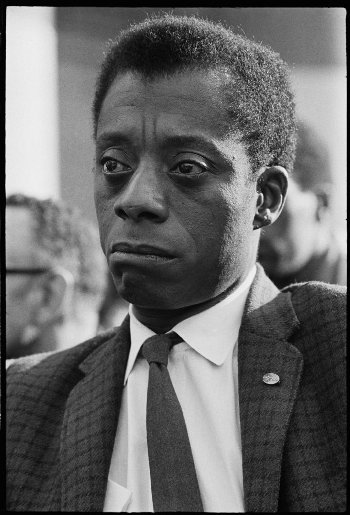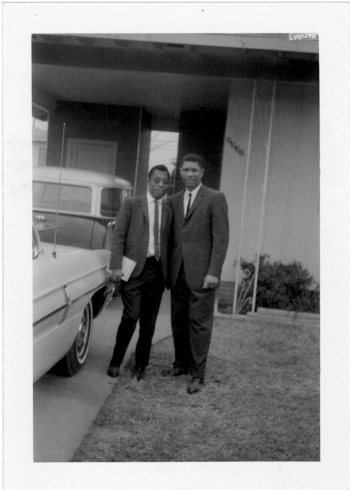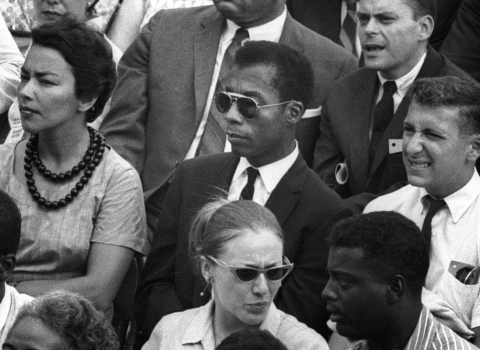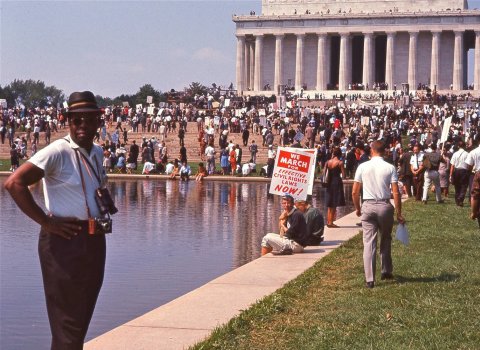Director Raoul Peck is not your typical
filmmaker. Even though he has established a solid set of credits such as
making the 2000 documentary Lumumba or his fictional 2005
narrative, Sometimes in April, the Port-au-Prince, Haiti, born
Peck has had his share of political experience as well.
From March 1996 to September 1997, he was
Haiti's Minister of Culture. He's currently also chairman of the French
National Film School. A citizen of the world, Peck has lived in the
United States, Berlin, Paris and elsewhere. At eight years-old, Peck's
family fled Haiti's Duvalier dictatorship and moved to Kinshasa,
Democratic Republic of the Congo (DRC), where his agronomist father
worked for the United Nations.
Born in 1953, this director and writer (Seven
Stories Press published Stolen Images, Peck's 2012 book of
screenplays and images from his four major features and documentary
films) lends his experience and gravitas to make I Am Not Your Negro, his
award-winning, Oscar-nominated documentary, worthy of the many accolades
being bestowed on it.
The film premiered at the 2016 Toronto
International Film Festival, where it won the People's Choice Award in
the documentary category. Now, it's a nominee for 2017's Academy Award
for Best Documentary Feature, shared with Rémi Grellety and Hébert Peck.
Based on groundbreaking Black author James Baldwin's unfinished
manuscript Remember This House, it explores the history of racism
in the United States through Baldwin's recollection of civil rights
leaders Medgar Evers, Malcolm X and Martin Luther King, Jr.
Through actor Samuel L. Jackson's sonorous
voice, Baldwin's words come alive as Peck illustrates the
interconnection of these important historic figures. An American
novelist, essayist, playwright, poet, and social critic, the late scribe
established his fiery views through such works as the non-fictional
1955's Notes of a Native Son, and The Fire Next Time, and
the novels Go Tell It on the Mountain, Giovanni's Room,
Another Country and Tell Me How Long the Train's Been Gone.
Peck intends to continue his exploration of
political thinking with The Young Karl Marx (Le jeune Karl Marx),
his long-planned narrative feature. Starring August Diehl, the film
explores the relationship between Marx and Frederick Engels as they
develop their ideas about communism. It will premiere at this year's
Berlin Film Festival.
The following edit of this exclusive Q&A was
recorded earlier this January.
 What was
the rationale in the timing of this film? It certainly coincides with a
very interesting set of events in this country.
What was
the rationale in the timing of this film? It certainly coincides with a
very interesting set of events in this country.
I was fortunate that I was able to make the
film I wanted to make. Even those [that were] brought to me, I made sure
that they were exactly what I wanted to make. You don't [just] go into
film. You don't even know if it's going to take three years or 10 years
[so the timing might be coincidental]. The only thing you know, is, it
better be fundamental. It better be strong. It better be original and
whenever it comes out, so be it. [As long as] you are right in the way
you do it, whatever the time... I'm not a journalist, so I'm not after
whatever is the color of the day.
What's a
journalist to you?
Well, a journalist has to report whatever, or
reflect whatever is in the actuality. Of course, you have some
journalists who can sit back a little bit more and have a bigger picture
which is rare. [Nowadays], it's about the tweet.
In
essence, you're giving life to this Baldwin test. You can still be a
journalist because you're finding all this footage and other material
and at the same time, your responsibility is ultimately to his words.
Of course, but I'm also an artist. If I make a
work, I want to make sure that 30 years from now, somebody will watch
the film and be able to get the same emotion. That's why I have to tell
a story. I have to create characters. It's not deducted. It's not just
that I choose the words and put them out there and when you read them,
you say, "Oh my God, it's incredible." I create a complex system where I
play with you as well. As a filmmaker, we are great manipulators. I
choose to manipulate you, but to make sure that you understand how I
manipulate you. I just bring you the story. I just get you into the
story. Why would not I do that when Hollywood does that the whole time
for other purposes? I don't sell popcorn. Hollywood does. It's fair
game. I make sure that I give you something that you will carry with you
and that, again, 30 years from now, it's a whole story with its own
beginning, middle and end. I need to create that reflection.
You've
just figured out a way to have us experience it because we never
experienced the actual book. Not that I'm over-emphasizing Baldwin over
your own creativity. It's your dialogue with Baldwin.
It was also conscious for me to set myself in
the background, because the project was, from the beginning, to put
these words in the front row. The words have helped me throughout my
life, words that are urgently needed today. That was part of the
problem. I didn't want any talking heads in the film. Nobody is an
intermediary. It's rare in documentary to also say, "The voice will be
Baldwin's voice. We're going be inside his head." The exercise for me
was always to make sure I'm inside his head. I am him. It's not about
me. My job as an actor would be, "Let's go into character." Make sure
that I'm always in character every minute of this film.
Was
Samuel L. Jackson always your choice to voice Baldwin and was there work
that needed to be done for him to get that voice down? It's far from his
normal, sometimes histrionic, Sam Jackson sound.
It was the result of many experiences I had,
including my own films. One of my first films when I was beginning was a
documentary on Patrice Lumumba where I used many voices until I decided
I was going to do the voice myself. This is something I understood very
early on and I never used the term "voiceover" or "narrator," because
once you use them, you've lost one of the most brilliant instruments in
a film. What you have to create is a character. When you go to somebody
and say, "I want you to be the voice," you're not asking them to read a
paper or to interpret a paper. I was asking Samuel Jackson to do his
work as an actor, to be the character and that's what I asked of him. I
said, "I don't want to hear your great voice. No, I want you to study
the character."
 He
embodied that voice better than ...
He
embodied that voice better than ...
I had a shortlist of three or four names. Of
course there is, I would say, a marketing aspect in it, in the terms
that if this film will have a chance, I better have a big name attached
to it. I had three names of very famous black actors. At the same time,
it was not a random choice. I needed people who have some sort of
personal street credibility. People who take a stand in their life.
People who have taken on issues in their life, in their society, in
their neighborhood or whatever, and people who have the voice of a real
person. Samuel Jackson is one of those people. When I asked him, he was
first on the list and because you can't ask all the three, you go to
number one and then go to the second, if the first one say no. He was at
the my top list and said, "Yes." That was great.
He did an
amazing job.
I didn't have to give him much direction
besides what I just told you. I want you to feel whatever you're saying
every single minute of it. When we were recording, that's what happened.
Sometimes he would say something and even before I say it, he say,
"Okay. I know. I know I'm doing it again" because it's like music. You
know when it's not the right note. Once you understand the whole
concept, you're just playing the notes. It's like jazz and you are
improvising. I can't tell him, "Sam, at the end of the phrase, I want
you to lower your voice in a way to show some sort of ..." How do you
say it? "Some sort of emotion, so that I can use it for the next
segments." No. He has to feel it.
He
understood it intuitively.
When you are in character, whatever you do is
good.
He
definitely channeled Baldwin. At least he had the reference of other
audio to know whether he was on the money.
The words are very powerful.
The fact
that you chose something at the end of Baldwin's life, we have an
overview of his whole universe. Even though you say it was a happy
accident that it is now available to us at this point, in light of
Trump's election, it's never been more relevant.
It's not just a "happy accident." There is a
story. It's mainly a political decision when 10, 11 years ago, I said,
"It's time to go back to Baldwin because of everything I've been
experiencing around me." It's about the canonization of Martin Luther
King, Black History Month, the Martin Luther King Day, the new Black
bourgeoisie who is looking at this from a distance. There's the black
artists who look at this from a distance and once in a while when the
anger is too much, they say something... But where are all the powerful
organizations? How come this money doesn't go to create a powerful
organization? How come we still are begging for "Oscars Not So White?"
This film comes out of all this. It's not like a decision of, "I should
do this." No, it's the result of many years of confrontation, of
experience, of my own work. I didn't just start making political films.
Once you go into that, whenever you finish, it's not important because
you know that the fundamental issues are not going to change. I knew it
was not going to change because of eight years of Obama.
That it's
not going to negate 400 years of...
It's not the way countries change. By the way,
Baldwin himself, there was a sentence in the film that we cut out but a
journalist was asking, "What will it [mean] for you when this country
will have its first black president?" He said, "It's not a matter of
who's going to be the first negro president. The real question is what
country is he going to be the president of?" That's the real question.
 They're
not going to let it go. They're not going to let it go so easy.
They're
not going to let it go. They're not going to let it go so easy.
Exactly. What it means is you need to face the
reality, not the reality you think or not the story they told you, not
the image that Hollywood fabricated. You have to be able to deconstruct
everything all the time. It will never finish.
Do you
think that your political experience makes you a better filmmaker?
There are people who... their whole life is
politics and they have a one-sided view and that's it. But so far, yes.
Because politics was never dogmatic for me, politics was never about a
party. I was never in a party. I supported certain parties. I worked
with a certain party and went into politics the way we understood it, as
a collective process. I didn't go in as an individual who wanted to be a
politician. I was asked to participate in a collective. It was a very
important moment where we were really needed, and I did it. Most of my
work is about power. It's like you have been working with sharks all
your life. Then one day, someone offers you to be able to live inside
the shark. So you say, "Yes." I wanted to go there. That's what
happened. I was taking notes everyday and seeing how power functioned.
What I saw in Haiti as a minister, that's what I saw in Bill Clinton's
cabinet, or in [Nicolas] Sarkozy's cabinet. There was a similarity you
can't even imagine. Once you have people in a position of power, you see
how they can abuse [it]. That also comes with it.
Do you
think that what we have with Barack Obama is kind of thesis, antithesis.
And then, we're going to see a synthesis? That's the Hegelian dialectic.
I would hope that the world is so
scientifically constructed, and that would mean the world would be
without human beings, who are never predictable. I'm very curious to see
how far the backlash will come from this new president, but again, we
are entering a process. We're not entering a definite period of events.
Every day, there will be a new item, new decision, new obstacles that
will ultimately write the meaning of the whole history, including the
resistance that it will provoke. History is not a passive thing. It's
whatever we will put on the table. Obama is a perfect example [of that].
If the people who elected him were half of the time also on the streets,
400,000, or one million demonstrating for healthcare, the healthcare
bill would have passed in much better condition. It's because again we
became consumers of our votes. We vote. Then, we go home.
What this
movie addresses, what Baldwin is addressing, is that kind of thing. Who
am I? Where do I fit in? Have I done enough on the streets?
He gives you all the necessary things you need
to build an organization when you say, "I was not part of this. I wasn't
part of that. I didn't do fundraising." He's giving you the layouts.
That's what you do, and organizing is not something you do for fun, it's
not something you just do out of anger. Anger will just bring you so
far. The rest is politics, organization and structuring.
How much
did you methodically follow what he wrote or how much did you edit in
your own terms?
Well again, as a filmmaker, it's of course, a
total construction. First of all, in Remember This House, what I
took primarily was the idea of bringing those three men together.
Telling of their friendship. Telling about their death. About how he
felt about their deaths. About their roles. How he saw them as human
beings. And their family. For me, that's the red line of the film – that
structures the film. The beginning of their relationship, they fight
together, they are coming closer, their assassination. Those are the
four big blocks. Within that then, I have the liberty to go to do a lot
of things that were essential for me, but which are all Baldwin's.
That's where I bring [in] my own choices. That's where I get that. I
knew it's part of the story. My job was to put in the layers and make
the film as rich as possible.
 Baldwin
also had the dual problem of being gay and being black in America at
that time. He was always dealing with the betrayals that he felt or like
that scene with the Kennedys and Lorraine Hansberry. They're there but
only up to a point. You brought those things to the fore. Those things
were touch points. You show the dynamic, the continuum between Baldwin
and all these people.
Baldwin
also had the dual problem of being gay and being black in America at
that time. He was always dealing with the betrayals that he felt or like
that scene with the Kennedys and Lorraine Hansberry. They're there but
only up to a point. You brought those things to the fore. Those things
were touch points. You show the dynamic, the continuum between Baldwin
and all these people.
That is one of the themes of the film, but it's
not the only one. One of the themes is how do you break the mythology of
America? I wrote in one of my introductions, when I was living in
Brooklyn, going to public school, I remember in the living room where we
were with a big family, [that had] a velvet rug with Kennedy, Martin
Luther King and Bob Kennedy [on it]. This was like, Christic, the three
brothers. I did believe in that idea. I came from a Catholic family. I
went to Jesuit schools and the idea [that] we are all [part of] the same
human race. I grew up with that, but it's not the truth. It's not
reality. Only a part of it is true, but that's not what the reality is.
The film is about deconstructing that whole thing. That's why I do it,
not only through the text ,but through the film as well. When I go into
images and deconstruct them, I play with it. Black and white color, 8mm,
35mm, video and photos. It's part of the construction.
The
construction is very elegant; you have such an aesthetic sense.
That's what I was supposed to do.
This film
shows a kind of a diagram of doing that.
What the film does, it's a mirror. I've told
audiences in discussions, "Whoever of you in this room, white or black,
you can't go out now and say you didn't know. You saw it, now it's your
decision. You can choose to ignore it, but you can't say you didn't know
because this is obvious." When Baldwin says, "Two worlds that never
crosses." This is it. This is reality. I'm not inventing it. I
demonstrate to you that it's there and how it came about. Now, you can
choose. I'm going to continue my life as it is or I'm going to... as
Baldwin said, "I'm going to face it." We have a long life behind us. We
have seen the world change.
So many
people have joined the struggle just at a critical point where you need
to go to the next level. I think Baldwin was also affected by that as
well, with people seeming to be with you and then you lose them. You
seem to getting people with you with the awards and all of that.
The award things, it can go both ways. Sometimes you can
say, "Wow. How come I have all these accolades?" When I made this film,
it was always with the intent of taking no prisoners. The film is a
personal experience. To put the image of Doris Day next to a hanging
woman, a lynching, you need guts to do that today. Any producer would
have said, "Don't do that." It was a huge risk, but at my age, having
most of my films behind me, that's fine with me. Having all of these
accolades is like, "Oh, where did I go wrong? How come everybody is..."
Email us Let us know what you think.